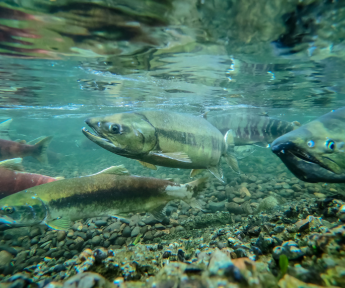Abstract
The cumulative effects of climate change and human activities pose major challenges for environmental management, a problem exemplified by Pacific salmon ecosystems. We offer an integrative treatment of both the science and policy levers of cumulative effects and reveal the sheer complexity of effective governance of salmon ecosystems in British Columbia, Canada. We then present and examine a hypothetical conceptualization of cumulative effects and their governance in salmon ecosystems to highlight several barriers and opportunities. We find that the progressive degradation of many salmon habitats appears to be enabled by the current policy approach through scarce monitoring, ineffective assessment, lack of legal limits, and isolated decision-making. At the same time, climate change magnifies the urgency of effective management as human activities act cumulatively with climate change impacts. However, our synthesis also highlights opportunities with existing but underused policy levers within Crown and Indigenous governance, as well as local co-governance arrangements, that could improve salmon ecosystem management. Although positive steps have been made toward managing several stressors, the current challenges facing Pacific salmon underscore the need for a fundamental shift in the treatment of cumulative effects.
Introduction
Multiple human activities cause cumulative harm to social-ecological systems around the world and pose a series of challenges for both science and management (Steffen et al. 2011). First, the cumulative impact of small incremental changes or stressors (Table 1) over time can lead to significant negative outcomes or “death by a thousand cuts” (Laurance 2010; Cohen 2012). Second, the effects of human activities on ecosystems are often complex and difficult to predict, especially when systems differ in their sensitivity to stressors due to their diverse environmental or ecological traits (Chezik et al. 2015; Lisi et al. 2015). Third, the impacts of activities can take years, decades, or even centuries to fully manifest or may be remote from the activity’s origin, impeding the rapid identification and mediation of effects (Downs and Piégay 2019). Fourth, impacts may accumulate from human activities from multiple jurisdictions within and between governments, which can create barriers to managing these effects (Scarlett and McKinney 2016).
Effectively addressing cumulative effects requires overcoming scientific challenges in detecting and predicting them, as well as policy shortcomings in managing these impacts equitably and inclusively. Regulatory frameworks for managing cumulative effects are often inadequate because they tend to require consideration of only the isolated effects of individual projects or activities rather than the cumulative impact of all activities over time (Parkes et al. 2016; Adams et al. 2023). Cumulative effects policies may also struggle to have inclusive processes that effectively incorporate plural and potentially conflicting values among stakeholders and rightsholders (Brush 2020; Pascual et al. 2023). In particular, political and economic pressure from industry on colonial governments and environmental regulators can result in disproportionate harm to the environment and Indigenous Peoples, such as the loss of traditional livelihoods (St-Laurent and Le Billon 2015; Muir 2022). Legal systems may uphold unjust social, economic, and political power structures and thus contribute to driving cumulative effects of human activities. Thus, if healthy and just futures for important ecosystems and people are a priority, there is an urgent need to understand how to more effectively and equitably regulate human activities that cause cumulative effects in ecosystems.
Salmon ecosystems are an essential part of the economic, cultural, and ecological tapestry of coastal North America, but they have been transformed since European contact. For over 10 000 years, human–salmon relationships have formed a foundation of complex social-ecological systems with sophisticated stewardship, laws, and deep connections between humans and ecosystems (Salmón 2000; Campbell and Butler 2010; Atlas et al. 2021). The persistence of human–salmon relationships over millennia, despite major climatic changes and disturbances (Waples et al. 2009), demonstrates the resilience of these social-ecological systems and the sustainable stewardship by Indigenous Peoples (Campbell and Butler 2010). However, Indigenous stewardship practices have been actively suppressed since the onset of European colonization (Truth and Reconciliation Commission 2015), and extractive and capitalistic practices have been prioritized in the management of Pacific salmon and ecosystems (Harris 2001; Atlas et al. 2021).


